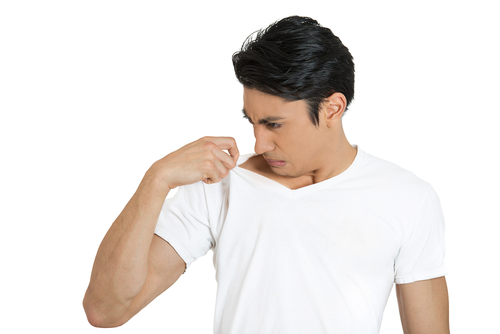Body odor is the unpleasant smell produced by bacteria on the skin that break down the acids in your sweat.The medical term is bromhidrosis.
Anyone who has reached puberty can produce body odor, as this is when the apocrine sweat glands develop, which produce the sweat that bacteria can quickly break down.
Men are more likely to have body odor, because they tend to sweat more than women.
Things that can make body odor worse include:
- Being overweight
- Consuming rich or spicy food and drink – such as garlic, spices and alcohol
- Some types of medication – such as antidepressants
- Certain medical conditions – a fruity smell can sometimes be a sign of diabetes, while a bleach-like smell may indicate liver or kidney disease
Hyperhidrosis is a condition where a person sweats excessively and much more than the body needs to regulate temperature. People with hyperhidrosis may develop body odor. If you have hyperhidrosis, you may also have smelly feet (bromodosis). Smelly feet are caused by wearing shoes and socks that prevent sweat evaporating or being absorbed, which attracts bacteria.
Diagnosis
In the vast majority of cases of body odor, it is not necessary to see your doctor. The individual himself/herself may be aware of it, or a good friend or a member of the household may tell them about their body odor. There are some self-care techniques that will usually successfully treat the problem.
When to see your doctor about body odor
Some medical conditions may change how much a person sweats, while others can alter how we sweat, subsequently changing the way we smell. For example, hyperthyroidism (an over-active thyroid gland) or the menopause can make people sweat much more, while liver disease, kidney disease, or diabetes can change the consistency of sweat so that the person smells differently.
You should see your doctor if:
- You start sweating at night
- You start sweating much more than you normally do, without any logical reason
- You have cold sweats
- Sweating disrupts your daily routine.
You should also see your doctor if your body smells differently. A fruity smell could indicate diabetes due to high levels of ketones in the bloodstream. Liver or kidney disease can often make the individual have a bleach-like smell due to a build-up of toxins in the body.
Managing body odor
Body odor can usually be managed by getting rid of excess skin bacteria – which are responsible for the smell – and keeping the skin in the affected area (usually the armpits) clean and dry. Your armpits contain a large number of apocrine glands, which are responsible for producing body odor.
Keeping your armpits clean and free of bacteria will help keep odor under control. Following the below advice can help you achieve this:
- Take a warm bath or shower every day – to kill the bacteria on your skin; on hot days, you may need to have a bath or shower twice a day
- Wash your armpits thoroughly – using an antibacterial soap
- Use a deodorant or an antiperspirant – after bathing or showering. Deodorants work by using perfume to mask the smell of sweat. Antiperspirants contain aluminium chloride (see below), which reduces the amount of sweat produced by your body. Use roll-on antiperspirants if you sweat heavily, as they tend to be more effective.
- Regularly shave/trim your armpits – this allows sweat to evaporate quicker, giving bacteria less time to break it down
- Wear natural fibres, such as wool, silk or cotton – they allow your skin to breathe, which means your sweat will evaporate quicker
- Wear clean clothes – make sure you wash your clothes regularly
- Limit the amount of spicy foods you eat – such as curry or garlic, because they can make your sweat smell; evidence also suggests that eating a lot of red meat tends to make body odour worse


